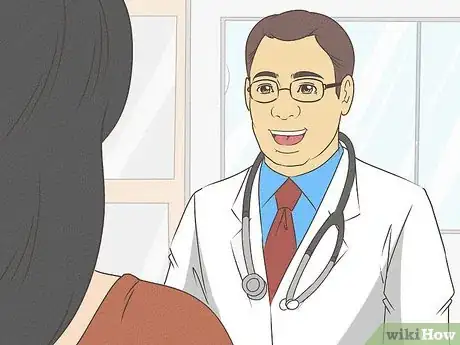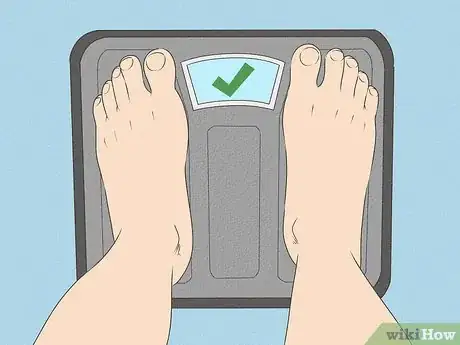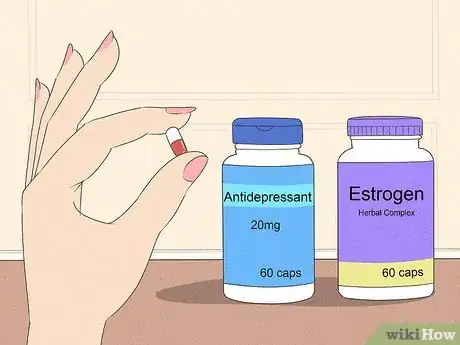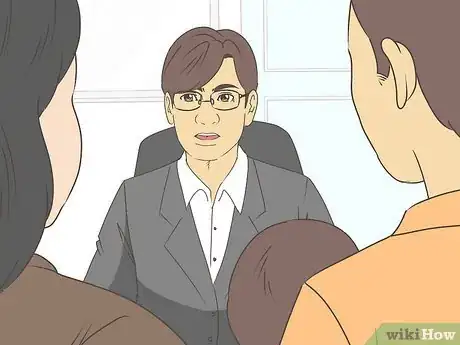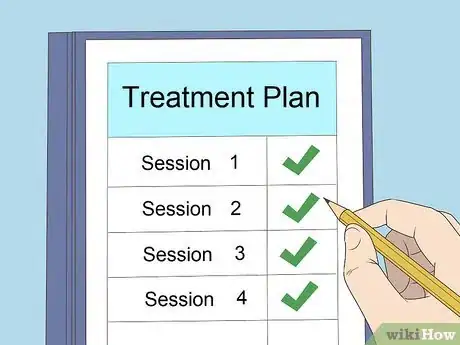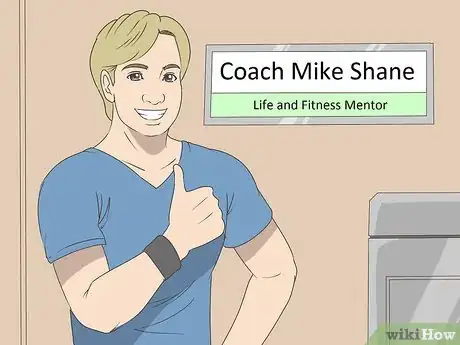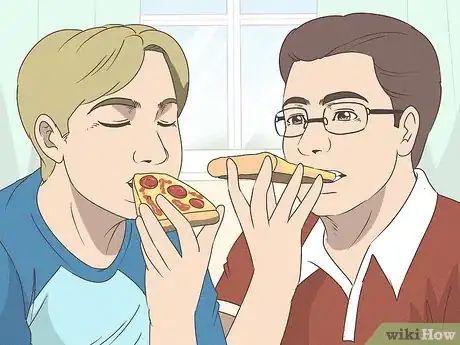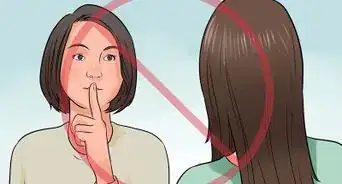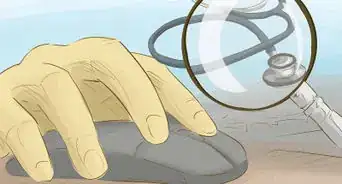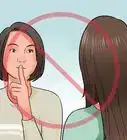This article was co-authored by Trudi Griffin, LPC, MS. Trudi Griffin is a Licensed Professional Counselor in Wisconsin specializing in Addictions and Mental Health. She provides therapy to people who struggle with addictions, mental health, and trauma in community health settings and private practice. She received her MS in Clinical Mental Health Counseling from Marquette University in 2011.
There are 13 references cited in this article, which can be found at the bottom of the page.
This article has been viewed 41,368 times.
When an individual refuses to consume the amount of food and drink required to maintain a healthy body weight, has a distorted body image, and an intense fear of gaining weight, that person has anorexia nervosa. Anorexia is an extremely dangerous eating disorder that can lead to severe dehydration, lowered blood pressure, bone density loss, and fainting among other consequences. Fortunately, most people who grapple with anorexia can beat it with the right combination of physical, psychological, and social therapy.
Steps
Meeting Your Physical Needs
-
1Seek emergency treatment if needed. Anorexia can cause severe, life-threatening health problems. If you are in need of urgent care, the absolute first thing you need to do is get to an emergency room.
- Seek emergency care if you're experiencing heart rhythm disturbances, dehydration, or electrolyte imbalances.[1]
- Symptoms of an electrolyte imbalance include: weakness, muscle spasms, numbness, confusion, irregular heartbeat, lethargy and seizures or convulsions.
- If you feel suicidal or want to harm yourself, you should also seek emergency care.
- Depending on the severity of your condition, the doctor may check you into the hospital for inpatient care. In less severe cases, you will be sent home for outpatient care.
-
2Meet with a registered dietitian. This individual will play a crucial role in your recovery. A professional dietitian can instruct you on how much weight you need to gain and the best foods to eat that can provide you with the calories and nutrients you need to improve your health.
- Dietitians will usually work with you to develop specific meal plans that cover each meal of each day in each week. These meals will include the calories you need while also being nutritionally balanced.
- A dietitian may also recommend a few appropriate vitamin and mineral supplements. These should never replace food, but they can be used to quickly supply your body with the nutrients it lacks.
Advertisement -
3Restore yourself to a healthy weight. Regardless of whether you've experienced complications or not, you need to bring your body up to a normal, healthy weight based on your height, sex, and age. Your doctors will work with you, but you also need to stay committed to this goal yourself.[2]
- In severe cases, you may initially need to be fed through a nasogastric tube inserted through the nose and into the stomach.
- Once your immediate nutritional needs are met, your long-term weight needs will be addressed.
- Usually, a weight gain between 1 and 3 lbs (450 and 1350 g) per week is considered a safe, healthy goal.
-
4Schedule regular check-ups. Your primary care physician will need to meet with you on a regular basis to check your body weight and overall health. It is best to schedule these appointments in advance.[3]
- During these check-ups, your vital signs, hydration, and electrolytes will be monitored. If any related conditions developed, these will be monitored as well.
-
5Find out about medications that may help. There is no medication currently formulated to treat anorexia directly, but there might be other conditions worsening your anorexia that can be treated with a prescription drug.
- Depression is also linked to anorexia, so you may end up needing an antidepressant to treat that aspect of your condition.[4]
- If you're assigned female, you might also be put on estrogen to help re-regulate your menstrual cycle and prevent your bones from fracturing.
Getting Psychological Treatment
-
1Admit that you have anorexia. There are plenty of resources that can help you, but for any of them to be beneficial, you must first admit to yourself that you have anorexia and that the condition poses a serious threat to your health and well-being.
- Until now, you've been plagued by the notion that you will feel better if you lose more weight. When you emphasize an unhealthy thought pattern for so long, it becomes a gut reaction, and it won't disappear overnight.
- You need to admit to yourself that the relentless pursuit of this goal has reached a problematic level. You also need to admit that you have undergone physical and emotional damage because of this pursuit.
-
2Undergo cognitive-behavioral therapy. Meet with a psychologist or counselor for individual sessions. Make sure to find a professional who has special training and experience treating eating disorders. This mental health professional should be able to work with you to discover the underlying psychological cause behind your eating disorder.
- With cognitive behavioral therapy (CBT), the therapist will help you understand how your thinking, negative self-talk, and negative self-image directly influence your negative eating habits.
- This means identifying dysfunctional thought patterns and beliefs, then working at solutions to correct them.
- Oftentimes, specific behavioral interventions will also be recommended. You might be asked to set goals and give yourself a reward for meeting those goals.
- CBT is time-limited, so you will get treatment for a set period of time. It can be done in an inpatient or outpatient manner.
-
3Consider family therapy. Social pressures and stresses often factor into the reasons for an individual's anorexia. If these issues may have some place in your own difficulties, consider talking to a family counselor, marriage counselor, or other group counselor.[5]
- Family therapy is the most common type of social therapy. It is usually done with the patient and entire family present, but in some cases, the family might be counseled without the patient present.
- Dysfunction within the family is often identified through these sessions. After identification, the therapist may work with the family unit to implement changes that can correct these problems.
- Sometimes certain family attitudes or dynamics unintentionally encourage anorexia. Be aware that families that emphasize perfection, have difficulty coping with negative emotions, and/or are concerned about appearance or physical fitness and body weight (the parents' and children's included) may contribute to the development of an eating disorder.[6]
-
4Stick to your treatment plan. There might be times when you are tempted to stop seeking help or skip a few sessions, but it's important that you stick to your treatment plan no matter how discouraged or uncomfortable you might feel. Eating disorders, including anorexia, have the highest mortality rate of all mental illnesses. Those who struggle with anorexia may die of malnutrition, organ failure, heart failure, or suicide. Getting the treatment you need could keep you alive.[7]
Accepting Emotional and Social Support
-
1Talk about it. Find a few trusted loved ones and try discussing the difficulties you have concerning your self-image and eating patterns.
- Know that it is natural to feel scared, ashamed, or complacent about talking to someone else. Regardless of these feelings, talking will still help.
- Make sure that the person you talk to will help instead of hurt. Someone who will encourage your unhealthy eating habits or someone who will cut you down would make a bad shoulder to cry on.
- If you feel uncomfortable confiding in a family member, find a trusted teacher or counselor to speak with instead.
-
2Search for a support group. Ask your doctor, nutritionist, or counselor to recommend a local eating disorder support group. Many of the people in the group will be dealing with similar issues, so you should be able to find both understanding and encouragement.
- Stick with formal support groups guided by a mental health professional for best results.
- Some informal groups can accidentally turn pro-anorexia and may encourage people to compete to see who is thinnest.
-
3Find a positive role model. Look for at least one person in your life who can stand strong as a model of both physical and mental health. When you feel conflicted about something that deals with your anorexia, turn to this individual for direction.
- Your role model could be someone you know personally or it could be a famous figure.
- Just make sure that your role model is actually a picture of good health. For instance, don't choose a super skinny supermodel or a famous weight loss expert. A better choice would be someone who is known to have a positive self-image in spite of having a less than perfect body.
-
4Stay away from triggers. Social, emotional, and psychological events that trigger feelings of poor self-image, low self-worth, or similar problems must be avoided, especially while you are actively on the road to recovery. It is important to examine the factors outside of yourself that could be having an effect on your behaviors. It's not blaming someone else or shirking responsibility; it's being able to gain a panoramic view of your life rather than an "up close" selfie.
- You may need to give up or rethink your participation in certain sports or activities with a focus on a thin body, such as ballet, gymnastics, modeling, acting, running, figure skating, swimming, jockeying, and wrestling.[8]
- Avoid looking at fashion and fitness magazines.
- Do not visit any websites that are pro-anorexia.
- Distance yourself from friends who are always dieting or discussing weight loss, or who encourage unhealthy weight loss (holding binging and eliminating parties, making weight-loss pacts, etc.).
- Resist the urge to step on the scale.
-
5Treat your body well. Look for ways to pamper your body from time to time. In treating your body with extra care, you can gradually learn to love it, which will make you less inclined to harm it through lack of eating.[9]
- Wear comfortable clothes. Wear styles that express your individuality rather than those that are meant to impress others.
- Pamper your body every so often with a massage, manicure, bubble bath, new perfume or cologne, scented lotion, or aftershave.
-
6Look for ways to remain active. You need to be both socially and physically active. Doing so can help regulate your mental and physical health. Keep in mind, however, that excessive exercise may be used by some people with eating disorders to compensate for eating. Don't fall out of one bad habit and into another. Speak with your doctors about what type and duration of exercise is appropriate for you.
- Intense cardiovascular exercise might make it difficult to put on weight, so you should cut down on this sort of activity. Light exercise like yoga, on the other hand, can keep your blood circulation healthy and promote a better sense of physical well-being.
- The temptation to isolate yourself during this time can be intense, but it is important that you resist it. Spend more time with friends and family. If this isn't an option, look for ways to get involved in your community.
-
7Give yourself reminders. Periodically remind yourself of what you have to lose if you give up and everything you have to gain if you continue on the path to recovery. Social support is important, but self-support is also important.
- One simple way to continually remind yourself is to write yourself notes. Write down words of encouragement, like "You are beautiful," or "You are a work in progress," and place them by your mirror or closet.
Helping Someone Else
-
1Be a positive influence. Let your loved one see you as a role model of mental and physical health. Maintain a balanced diet and treat your own body with love and respect. Avoid tearing yourself down when you spot something about your body you may not like. Model a healthy body image by speaking highly of yourself and doing what you can to de-emphasize an "ideal" body type that may be idolized in the media. You never know who may be watching you that needs encouragement.[10] [11]
- Eat well and exercise.
- Do not keep fashion and fitness magazines laying around your living area, particularly where they might be in view of your loved one.
- Do not make negative comments about your weight or someone else's weight.
- Compliment your friend or family member about non-image related attributes such as being smart or creative.
-
2Share a meal. A good way to gradually ease your loved one back into healthy eating habits is to spend more time sharing meals with them. Make the overall experience an enjoyable one to reinforce eating as a positive event.[12]
-
3Support without suffocating. You need to make yourself available to your loved one, but pressuring them can actually cause the individual to pull away from you. Always remind the person that you are available to talk or just listen if they ever need you.
- Avoid behaving like the food police. You might make mental notes of the foods and calories your loved one consumes, but don't stand over their shoulder during mealtime.
- Avoid negative communication overall. This means skipping the threats, scare tactics, angry outbursts, and insults.
- Reinforce positive behaviors instead of spending time focusing on negatives. Congratulate your loved one on small steps in the right direction, like eating a full meal or refraining from bad-mouthing themselves in the mirror.
-
4Remain patient and calm. In some sense, you need to view yourself as an objective observer. This is your loved one's struggle, not yours. Making this distinction can help prevent you from taking the whole thing as a personal insult.[13]
- Viewing yourself as an observer or an outsider may make you feel a little helpless at first, but in forcing you to acknowledge that the resolution is out of your control, it can help you behave more rationally and objectively.
- Take care of your own mental health. If your loved one's anorexia has triggered emotional or psychological problems of your own, seek help from a professional counselor.
Expert Q&A
-
QuestionHow do you feel when you have anorexia?
 Mindy Lu, LMHC, CNMindy Lu is a Certified Nutritionist (CN), Licensed Mental Health Counselor (LMHC), and the Clinical Director of Sunrise Nutrition, a nutrition and therapy group practice in Seattle, Washington. Mindy specializes in eating disorders, body image concerns, and chronic dieting. She holds an MS in Nutrition and Clinical Health Psychology from Bastyr University. Mindy is a Licensed Counselor and Nutritionist and is known for her warm therapeutic style and culturally-inclusive lens in healing. She is a member of the Multicultural Counselors of Washington State and the Association for Size Diversity and Health.
Mindy Lu, LMHC, CNMindy Lu is a Certified Nutritionist (CN), Licensed Mental Health Counselor (LMHC), and the Clinical Director of Sunrise Nutrition, a nutrition and therapy group practice in Seattle, Washington. Mindy specializes in eating disorders, body image concerns, and chronic dieting. She holds an MS in Nutrition and Clinical Health Psychology from Bastyr University. Mindy is a Licensed Counselor and Nutritionist and is known for her warm therapeutic style and culturally-inclusive lens in healing. She is a member of the Multicultural Counselors of Washington State and the Association for Size Diversity and Health.
Certified Nutritionist & Licensed Counselor If you have anorexia, you may feel tired, irritable, and have mood swings. If you think you have an eating disorder, I suggest you talk to your doctor or ask a friend for help.
If you have anorexia, you may feel tired, irritable, and have mood swings. If you think you have an eating disorder, I suggest you talk to your doctor or ask a friend for help.
Warnings
- If you suspect that you or someone you know might be struggling with anorexia, seek help as early as possible. The earlier you seek treatment, the sooner you can recover. Early treatment can also prevent some of the more severe health complications.⧼thumbs_response⧽
References
- ↑ http://www.mayoclinic.org/diseases-conditions/anorexia/basics/treatment/con-20033002
- ↑ https://www.nationaleatingdisorders.org/anorexia-nervosa
- ↑ https://www.nlm.nih.gov/medlineplus/ency/article/000362.htm
- ↑ http://www.adaa.org/understanding-anxiety/related-illnesses/eating-disorders
- ↑ http://www.maudsleyparents.org/whatismaudsley.html
- ↑ http://www.webmd.com/mental-health/eating-disorders/tc/eating-disorders-cultural-and-social-factors-topic-overview
- ↑ http://www.anad.org/get-information/about-eating-disorders/eating-disorders-statistics/
- ↑ https://www.webmd.com/mental-health/eating-disorders/understanding-eating-disorders-teens#2
- ↑ http://blogs.psychcentral.com/weightless/2010/03/tips-for-overcoming-eating-disorders-and-boosting-your-body-image-from-andrea-roe/

